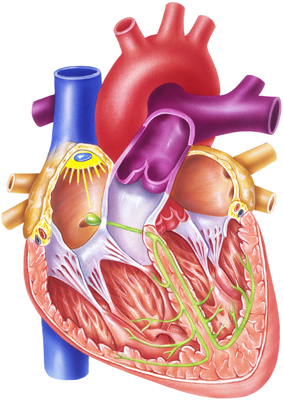

Besides age, risk factors for developing a valve disease include high cholesterol, high blood pressure, obesity, smoking, diabetes, and a family history of heart disease. Both men and women can develop a valve disease, but it may affect them differently.
There are four valves of the heart — tricuspid, pulmonary, mitral and aortic — that work to keep blood flowing smoothly with their flap-like doors or leaflets. These leaflets open in response to pressure changes and close securely to prevent a backflow of blood. Heart valve disease prevents the leaflets from either opening sufficiently or closing evenly.
The more common valve diseases affect the mitral and aortic valves and include:
- Mitral Valve Prolapse (MVP). MVP is the most common valve disease. This occurs when the valve doesn’t close evenly because one or both of the valve leaflets is enlarged or floppy. Most people with MVP will have no symptoms, but some people experience palpitations, chest discomfort, fatigue and dizziness. Generally, MVP is diagnosed when a physician hears a click and a murmur during a regular physical exam. Some individuals with MVP have mitral valve regurgitation, where blood may leak back into the lungs causing shortness of breath and chest pain. The incidence of MVP in men is steady across all age groups, while it’s more common in younger women. Men are more likely to require surgical treatment as well.
When surgery is required, one option is a minimally invasive approach called MitraClip — a technology pioneered at El Camino Hospital by Dr. Frederick St. Goar. The MitraClip is inserted via a catheter guided through a vein in the leg. This procedure has been used worldwide and is proven to reduce hospitalizations for heart failure. - Aortic Stenosis. When the aortic valve narrows, generally because of thickening or calcification, it prevents the valve from opening properly, and can result in aortic stenosis. This means that the heart is working much harder to pump blood from the heart ventricle into the aorta and the rest of the body, causing extra stress that can lead to heart failure. Aortic stenosis generally affects men and women over the age of 75, and requires surgery to correct.
In some cases open heart surgery may be necessary, but patients who aren’t candidates for that may be able to have transcatheter aortic valve replacement (TAVR). Much like the MitraClip, the CoreValve device is inserted via a catheter guided through a vein in the leg or in the chest, and the valve is then repaired.
El Camino Hospital’s Norma Melchor Heart & Vascular Institute has specialists committed to providing heart patients with the highest level of care. From advanced, minimally invasive treatments to sophisticated diagnostic technology and heart attack care expertise — our cardiovascular experts can help you achieve optimal help. If you have a heart issue or are concerned about your heart health, call 650-940-7000.
This article first appeared in the September 2017 edition of the HealthPerks newsletter.

